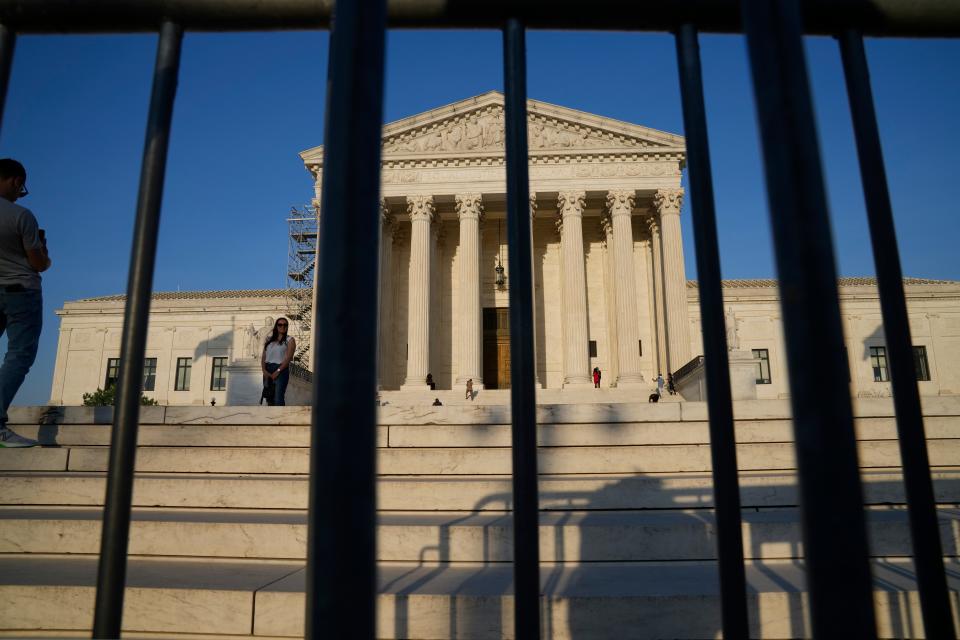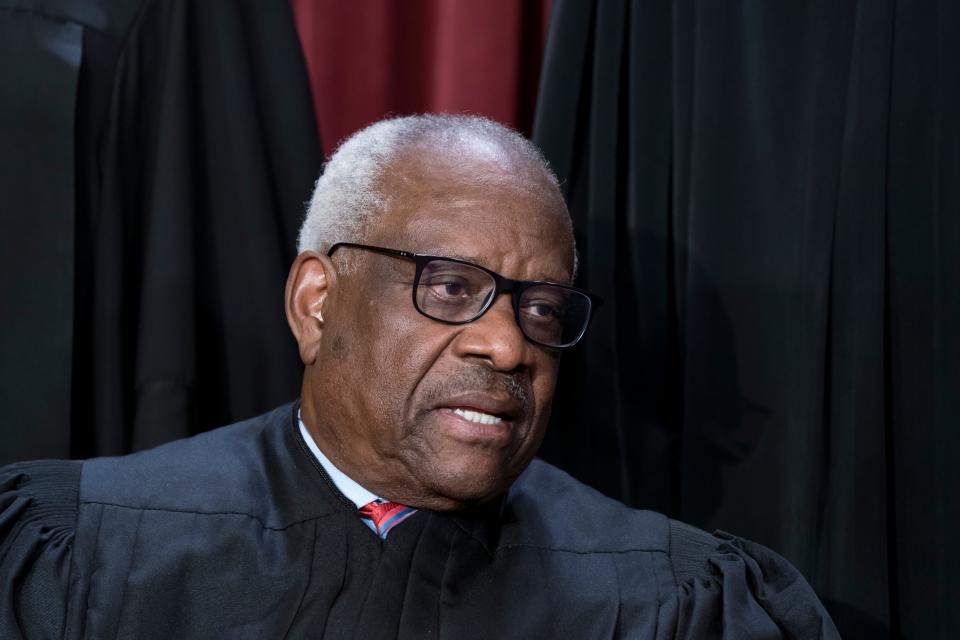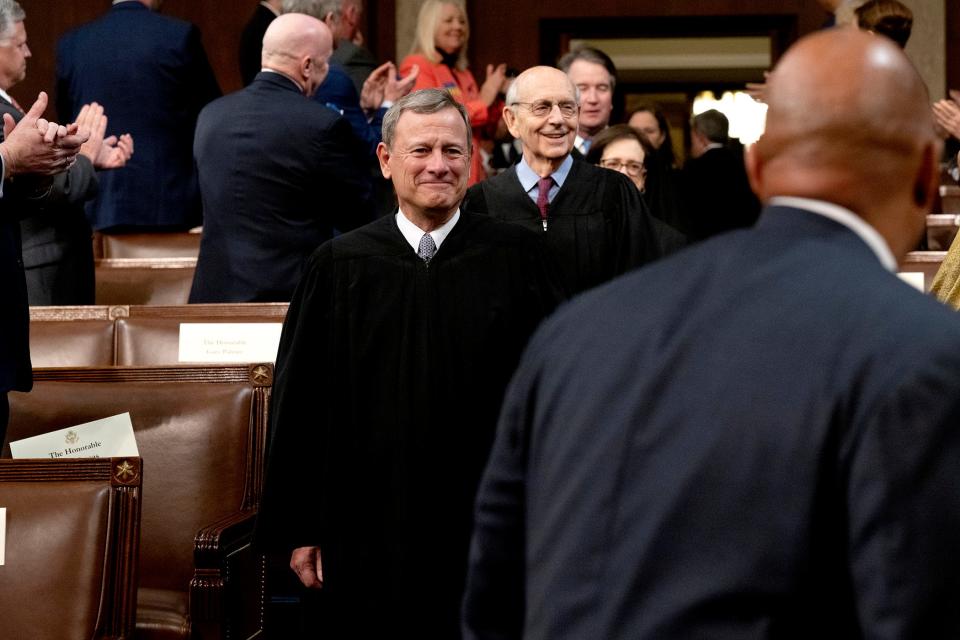Do past Supreme Court cases offer clues about how the justices view ethics, transparency?
- Oops!Something went wrong.Please try again later.
- Oops!Something went wrong.Please try again later.
WASHINGTON – The Supreme Court has largely hunkered down in silence amid a wave of scrutiny heaped onto Justice Clarence Thomas over gifts he and his family accepted from Republican donor Harlan Crow.
But the court’s conservative majority – including Thomas – has offered clues into its broader views about ethics and disclosure in a number of high-profile cases dealing with corruption and transparency, even though the disputes involved vastly different circumstances and legal questions than those that confront the court today.
One of those cases dealt with a state justice who declined to recuse himself from a case involving a business executive who donated $3 million to his election campaign. Another matter focused on a corruption conviction for the former governor of Virginia, Bob McDonnell.
Report: "No mention of Ginni.' Conservative activist directed money to wife of Justice Clarence Thomas
Tuition: GOP donor Harlan Crow paid private tuition for relative of Justice Clarence Thomas
As it heads into the final stretch of its current term, the Supreme Court is on defense following a series of revelations about gifts, property sales and disclosure. Most, but not all, of that attention has been focused on Thomas. The senior associate justice, along with his family, sold property to Crow, accepted trips on Crow’s private jet and luxury yachts and allowed Crow to pay the private school tuition of a grandnephew.
Here’s a look at some recent cases the court decided involving ethics and disclosure.
When should a judge recuse?
In a 2009 decision in Caperton v. Massey a 5-4 majority ruled that a West Virginia Supreme Court of Appeals justice should have recused in a lawsuit against A.T. Massey Coal Co. Before the case reached the state’s high court, Massey's C.E.O. donated $3 million to the justice's campaign.
Chief Justice John Roberts dissented, writing that the court had opened up a "probability of bias" standard that could not be easily defined.
"This will inevitably lead to an increase in allegations that judges are biased, however groundless those charges may be," Roberts wrote in an opinion joined by Thomas and two others. "The end result will do far more to erode public confidence in judicial impartiality than an isolated failure to recuse in a particular case."

'Judges are not politicians'
Roberts wrote the 5-4 majority opinion in a 2015 case questioning whether a provision of Florida's judicial code of conduct that barred judicial candidates from personally soliciting campaign funds violated the First Amendment. Roberts, joined by the court's liberal wing at that time, ruled the prohibition constitutional.
"Judges are not politicians, even when they come to the bench by way of the ballot," Roberts wrote. "A state may assure its people that judges will apply the law without fear or favor − and without having personally asked anyone for money."
Senate: 'Lowest ethical standards.' Lawmakers spar over Supreme Court, Clarence Thomas revelations
Roberts: Chief Justice John Roberts declines to testify on ethics, Clarence Thomas revelations
Justice Antonin Scalia dissented in an opinion joined by Thomas. The prohibition, he said, violated the principle of freedom of speech. The majority, he wrote, seemed to be focused exclusively on the "preservation of public respect" for courts.
"The First Amendment," Scalia wrote, "is not abridged for the benefit of the Brotherhood of the Robe."

Political disclosure requirements
In its landmark 2010 decision in Citizens United v. FEC, a majority of the court lifted limits on independent spending by corporations and unions. The Supreme Court, however, upheld federal disclosure requirements.
“This transparency,” Justice Anthony Kennedy wrote for the majority, “enables the electorate to make informed decisions and give proper weight to different speakers and messages.”
Fix: Would a code of ethics fix the Supreme Court? Some raise concerns about enforceability
Religion: Supreme Court signals it may make it easier for some workers to make religious requests
Thomas agreed with the court's decision to lift the spending caps but dissented from the majority opinion on the disclosure requirements. Campaign contributions, under the law, are a form of speech, Thomas noted. Requiring disclosure, he said, may chill that speech because it reveals donors’ identities and exposes them to retaliation.
"I cannot endorse a view of the First Amendment that subjects citizens of this nation to death threats, ruined careers, damaged or defaced property, or pre-emptive and threatening warning letters as the price for engaging in 'core political speech,'" Thomas wrote in his partial dissent.

'Ferraris, Rolexes, and ball gowns'
While Thomas sometimes winds up voting with the minority when it comes to cases involving ethics, he joined a unanimous decision in 2016 that granted a reprieve to Bob McDonnell. The former Republican governor of Virginia was convicted of accepting luxury gifts and loans from a wealthy businessman in exchange for performing "official acts" on his behalf.
The court vacated the conviction, ruling McDonnell's actions were commonplace.
"Setting up a meeting, calling another public official, or hosting an event does not, standing alone, qualify as an 'official act,'" Roberts wrote for the court.
"There is no doubt that this case is distasteful; it may be worse than that," Roberts wrote. "But our concern is not with tawdry tales of Ferraris, Rolexes, and ball gowns." A more limited view of the term "official act," Roberts wrote, "leaves ample room for prosecuting corruption."
This article originally appeared on USA TODAY: Clarence Thomas: Rulings offer clues of Supreme Court views on ethics

